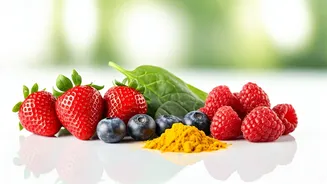Leafy Green Power
Leafy greens are nutritional powerhouses. They're rich in vitamins, minerals, and antioxidants, all crucial for combating inflammation. Think spinach,
kale, and collard greens. These greens contain compounds that actively reduce inflammation within the body. Include a variety of leafy greens in your diet through salads, smoothies, or cooked dishes to maximize their anti-inflammatory benefits. Their versatility makes them easy to incorporate into many meals, ensuring you get a consistent dose of their health-boosting properties. Regular consumption can lead to reduced inflammation and a healthier, more vibrant you.
Turmeric's Golden Touch
Turmeric, a spice popular in Indian cuisine, is renowned for its anti-inflammatory properties, largely due to curcumin, its active compound. Curcumin is a potent antioxidant that can help neutralize free radicals, reducing inflammation at a cellular level. It has been used for centuries in traditional medicine to treat various ailments associated with inflammation. To gain the most from turmeric, consume it with black pepper. Black pepper enhances curcumin absorption. You can add turmeric to curries, stews, or even beverages like golden milk for an extra health boost.
The Goodness of Ginger
Ginger, another common spice, offers considerable anti-inflammatory benefits. Gingerol, the primary bioactive compound in ginger, is responsible for these effects. It works by reducing the production of inflammatory molecules in the body. Besides its anti-inflammatory actions, ginger has also been shown to help with digestion and reduce nausea. Include fresh ginger in your cooking, add it to teas, or consume it in supplement form to experience its health advantages. It is a versatile ingredient, easily incorporated into both sweet and savory recipes.
Benefits of Garlic
Garlic, a staple in many cuisines, contains allicin, a compound with potent anti-inflammatory and antioxidant properties. Allicin is formed when garlic is crushed or chopped. It then works to inhibit inflammatory pathways, potentially providing relief from conditions linked to inflammation. Consuming garlic regularly can also benefit cardiovascular health and boost the immune system. Incorporate garlic into your diet by adding it to savory dishes, roasting it, or consuming it raw. Its pungent flavor enhances many dishes while offering valuable health benefits.
Berries' Antioxidant Richness
Berries, such as blueberries, strawberries, and raspberries, are packed with antioxidants, especially anthocyanins, which fight inflammation. These compounds give berries their vibrant colors and powerful anti-inflammatory effects. They combat free radicals, protecting cells from damage and reducing inflammation. Berries are also high in fiber and vitamins, adding to their nutritional value. Include berries in your diet by enjoying them as a snack, adding them to smoothies, or incorporating them into your breakfast cereal or yogurt. Their delicious taste and health benefits make them a valuable addition to any diet.
The Power of Nuts
Nuts, like almonds, walnuts, and cashews, contribute to reducing inflammation. They contain healthy fats, fiber, and antioxidants, which support overall health and counteract inflammation. These healthy fats aid in managing inflammatory responses, while antioxidants protect against cellular damage. Eating nuts in moderation provides essential nutrients and boosts your health. Opt for a handful of nuts as a snack, add them to salads, or include them in your breakfast. Ensure that you choose raw or dry-roasted nuts to maximize their benefits and avoid added unhealthy oils and salts.
Olive Oil's Healthy Fats
Olive oil, especially extra virgin olive oil, is rich in oleocanthal, a compound with potent anti-inflammatory effects. Oleocanthal inhibits inflammatory pathways, much like ibuprofen. Olive oil also contains monounsaturated fats, beneficial for heart health and also help to manage inflammation. Use olive oil for cooking, drizzling over salads, or as a dip for bread. Make sure to choose high-quality olive oil to ensure you are getting the most of its health benefits. Incorporating olive oil into your diet can be a simple yet effective way to manage inflammation and boost overall well-being.
Green Tea's Antioxidants
Green tea is an excellent source of antioxidants, especially epigallocatechin gallate (EGCG), which has substantial anti-inflammatory properties. EGCG neutralizes free radicals and reduces inflammation throughout the body. Green tea also provides numerous other health benefits, like improved brain function and heart health. Drinking green tea regularly can assist in reducing inflammation and promoting overall health. Consume green tea as a beverage, either hot or iced. You can also find it in supplement form for added convenience.
Superfoods and Wellness
By incorporating these nine superfoods into your diet, you can support your body's natural defenses and combat inflammation. These foods work synergistically to provide a wide range of vitamins, minerals, and antioxidants, all vital for health. Remember that making lasting dietary changes requires consistency. Combining these superfoods with a balanced lifestyle that includes regular exercise and stress management further boosts the benefits. Make a conscious effort to consume these foods regularly for long-term health and well-being. Always consult with a healthcare professional to ensure these changes align with your individual health needs.




















